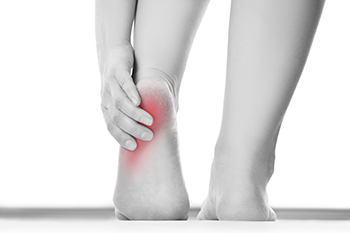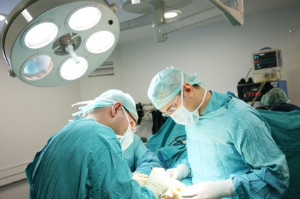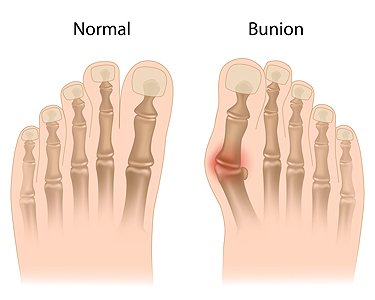Connect With Us
Blog
Items filtered by date: March 2023
Heel Pain and Cancer

Heel pain can be an annoyance for a variety of patients for many different reasons. For example, heel pain may be linked to a condition known as plantar fasciitis. Alternatively, heel pain could be caused by an individual’s obesity and the extent to which their excess weight is putting added pressure on the feet. However, heel pain might also be a side effect of certain cancer treatments. Sometimes, when an individual with cancer receives treatment, heel pain can result. The reason for this is that some treatments lead to a loss of bone density and even muscle wasting. As a result, conditions such as plantar fasciitis can become more likely and ultimately cause heel pain. If you are someone that is receiving cancer treatment and you have heel pain, it is suggested that you contact a podiatrist today.
Many people suffer from bouts of heel pain. For more information, contact Scott Matthews, DPM, MD of Salem Foot Care . Our doctor can provide the care you need to keep you pain-free and on your feet.
Causes of Heel Pain
Heel pain is often associated with plantar fasciitis. The plantar fascia is a band of tissues that extends along the bottom of the foot. A rip or tear in this ligament can cause inflammation of the tissue.
Achilles tendonitis is another cause of heel pain. Inflammation of the Achilles tendon will cause pain from fractures and muscle tearing. Lack of flexibility is also another symptom.
Heel spurs are another cause of pain. When the tissues of the plantar fascia undergo a great deal of stress, it can lead to ligament separation from the heel bone, causing heel spurs.
Why Might Heel Pain Occur?
- Wearing ill-fitting shoes
- Wearing non-supportive shoes
- Weight change
- Excessive running
Treatments
Heel pain should be treated as soon as possible for immediate results. Keeping your feet in a stress-free environment will help. If you suffer from Achilles tendonitis or plantar fasciitis, applying ice will reduce the swelling. Stretching before an exercise like running will help the muscles. Using all these tips will help make heel pain a condition of the past.
If you have any questions please contact our office located in Wikesboro, NC . We offer the newest diagnostic and treatment technologies for all your foot and ankle needs.
Surgery For Plantar Fasciitis

Severe cases of the foot condition that is known as plantar fasciitis may require surgery for better relief. The plantar fascia is found on the bottom of the foot, and it is the band of tissue that connects the heel to the toes. It can become damaged suddenly from an injury, or it may happen gradually from wearing shoes that do not fit correctly. A torn plantar fascia can result in developing plantar fasciitis and many cases can be successfully treated by wearing orthotics or by changing the shoes that are worn. Surgery is often a final option after less invasive treatments have proven to be ineffective. There may be risks that are associated with this type of surgery, including recurring heel pain, infection, or a delay in completing daily activities. If you have heel pain, it is suggested that you consult with a podiatrist who can properly diagnose this condition, and discuss surgery options, if applicable.
Foot surgery is sometimes necessary to treat a foot ailment. To learn more, contact Scott Matthews, DPM, MD of Salem Foot Care . Our doctor will assist you with all of your foot and ankle needs.
When Is Surgery Necessary?
Foot and ankle surgery is generally reserved for cases in which less invasive, conservative procedures have failed to alleviate the problem. Some of the cases in which surgery may be necessary include:
- Removing foot deformities like bunions and bone spurs
- Severe arthritis that has caused bone issues
- Cosmetic reconstruction
What Types of Surgery Are There?
The type of surgery you receive will depend on the nature of the problem you have. Some of the possible surgeries include:
- Bunionectomy for painful bunions
- Surgical fusion for realignment of bones
- Neuropathy decompression surgery to treat nerve damage
Benefits of Surgery
Although surgery is usually a last resort, it can provide more complete pain relief compared to non-surgical methods and may allow you to finally resume full activity.
Surgical techniques have also become increasingly sophisticated. Techniques like endoscopic surgery allow for smaller incisions and faster recovery times.
If you have any questions please feel free to contact our office located in Wikesboro, NC . We offer the newest diagnostic and treatment technologies for all your foot and ankle needs.
Foot Pain Can Come From Using a Treadmill

When you take a step, the foot takes on the entire weight of your body. After a while, whether through exercise, weight gain, or simply aging, foot pain can become a part of life. This can be true whether you walk on pavement or use a treadmill to get in shape. A number of factors should be taken into account to determine the cause of treadmill-related foot pain. First on the list is footwear. Wearing the wrong shoes while on the treadmill can cause weight to be distributed poorly. When selecting the proper shoe, pay attention to arch support, the width of the toe box, and how the sole is constructed. Another cause of foot pain from treadmill walking may involve the incline being used. If it is too high, it may put tendons and ligaments at risk of injury. Working out on a treadmill may not be the best choice for people who are overweight, as the extra force with each step can increase the chances of incurring a foot injury. Finally, walking on a treadmill can cause plantar fasciitis and stress fractures, both of which are common repetitive stress foot injuries. For more information on foot pain related to treadmill exercise, it is suggested that you consult a podiatrist.
Foot Pain
Foot pain can be extremely painful and debilitating. If you have a foot pain, consult with Scott Matthews, DPM, MD from Salem Foot Care . Our doctor will assess your condition and provide you with quality foot and ankle treatment.
Causes
Foot pain is a very broad condition that could be caused by one or more ailments. The most common include:
- Bunions
- Hammertoes
- Plantar Fasciitis
- Bone Spurs
- Corns
- Tarsal Tunnel Syndrome
- Ingrown Toenails
- Arthritis (such as Gout, Rheumatoid, and Osteoarthritis)
- Flat Feet
- Injury (from stress fractures, broken toe, foot, ankle, Achilles tendon ruptures, and sprains)
- And more
Diagnosis
To figure out the cause of foot pain, podiatrists utilize several different methods. This can range from simple visual inspections and sensation tests to X-rays and MRI scans. Prior medical history, family medical history, and any recent physical traumatic events will all be taken into consideration for a proper diagnosis.
Treatment
Treatment depends upon the cause of the foot pain. Whether it is resting, staying off the foot, or having surgery; podiatrists have a number of treatment options available for foot pain.
If you have any questions, please feel free to contact our office located in Wikesboro, NC . We offer the newest diagnostic and treatment technologies for all your foot care needs.
Juvenile Hallux Valgus

Bunions, or hallux valgus, is a surprisingly common ailment in the forefoot of children. A bunion is a bony growth that develops on the joint of the big toe and often causes this toe to lean towards the smaller toes. Having a bunion can cause pain and discomfort, particularly because the bunion rubs against shoes. Wearing wider shoes can provide mild relief, but sometimes surgery is the best option for treatment among those in this age group. This is typically successful in children because their growth plates are active, which helps with healing and readjustment of the toe joint. If your child has a bunion that is causing pain, it is suggested that you see a podiatrist for an examination and treatment options to consider.
If you are suffering from bunions, contact Scott Matthews, DPM, MD of Salem Foot Care . Our doctor can provide the care you need to keep you pain-free and on your feet.
What Is a Bunion?
A bunion is formed of swollen tissue or an enlargement of boney growth, usually located at the base joint of the toe that connects to the foot. The swelling occurs due to the bones in the big toe shifting inward, which impacts the other toes of the foot. This causes the area around the base of the big toe to become inflamed and painful.
Why Do Bunions Form?
Genetics – Susceptibility to bunions are often hereditary
Stress on the feet – Poorly fitted and uncomfortable footwear that places stress on feet, such as heels, can worsen existing bunions
How Are Bunions Diagnosed?
Doctors often perform two tests – blood tests and x-rays – when trying to diagnose bunions, especially in the early stages of development. Blood tests help determine if the foot pain is being caused by something else, such as arthritis, while x-rays provide a clear picture of your bone structure to your doctor.
How Are Bunions Treated?
- Refrain from wearing heels or similar shoes that cause discomfort
- Select wider shoes that can provide more comfort and reduce pain
- Anti-inflammatory and pain management drugs
- Orthotics or foot inserts
- Surgery
If you have any questions, please feel free to contact our office located in Wikesboro, NC . We offer the newest diagnostic and treatment technologies for all your foot care needs.
Blog Archives
- April 2025
- March 2025
- February 2025
- January 2025
- December 2024
- November 2024
- October 2024
- September 2024
- August 2024
- July 2024
- June 2024
- May 2024
- April 2024
- March 2024
- February 2024
- January 2024
- December 2023
- November 2023
- October 2023
- September 2023
- August 2023
- July 2023
- June 2023
- May 2023
- April 2023
- March 2023
- February 2023
- January 2023
- December 2022
- November 2022
- October 2022
- September 2022
- August 2022
- July 2022
- June 2022
- May 2022
- April 2022
- March 2022
- February 2022
- January 2022
- December 2021
- November 2021
- October 2021
- September 2021
- August 2021
- July 2021
- June 2021
- May 2021
- April 2021
- March 2021
- February 2021
- January 2021
- December 2020
- November 2020
- October 2020
- September 2020
- August 2020
- July 2020
- June 2020
- May 2020
- April 2020
- March 2020
- February 2020
- January 2020
- December 2019
- November 2019
- October 2019
- September 2019
- August 2019
- July 2019
- June 2019
- May 2019
- April 2019
- March 2019
- February 2019
- January 2019
- December 2018
- November 2018
- October 2018
- September 2018
- August 2018
- July 2018
- June 2018
- May 2018

